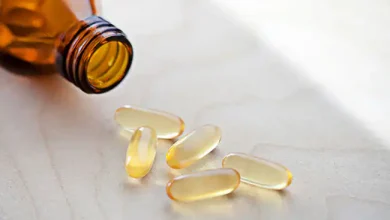List of the Best Vitamins for Skin Care

Vitamins for Skin Care
As the health and wellness business grows, it can be tough to know which vitamins are ideal for healthy skin and which supplements are optimal for each bodily system. When it comes to glowing skin, we’ve broken down which skin vitamins to include in your routine, whether you’re taking an oral supplement, putting them in your diet, or applying them topically to your skin.
Vitamin A
When it comes to keeping your skin healthy, vitamin A is one of the most vital vitamin supplements. It functions as an antioxidant, can prevent UV damage, and attaches to receptors in skin cells to help build the epidermis, so it benefits every layer of the skin. Your skin can become dry, itchy, and rough if you don’t get enough Vitamin A.
Over-the-counter retinol is the most popular type of Vitamin A in skincare. Retinol is a potent Vitamin A derivative that is administered to the skin topically. It promotes skin cell turnover, which results in the formation of new healthy skin layers. Because new skin cells proliferate faster and replace the acne, retinol can be an effective acne fighter. Vitamin A, in the form of tretinoin, a prescription topical therapy, can help with hyperpigmentation and fine wrinkles.
Although retinols and tretinoin are incredibly potent and effective, they can be somewhat harsh at first, especially for people with sensitive skin. Because of the increased skin cell production, you may suffer redness and dryness at first. Start with a lower concentration formula and avoid using retinol every day if you are experiencing these negative effects. Apply it every other day, right before your moisturiser, at the end of your nighttime skincare routine. Retinol should not be used first thing in the morning because it leaves your skin more vulnerable to sun damage. Finally, when using Vitamin A derivatives, be patient. The ideal outcomes will take a few weeks to appear. You should start noticing benefits by the end of the first month. Fine wrinkles and hyperpigmentation will fade away, leaving you with healthier, more radiant skin.
Vitamin C
High quantities of vitamin C are naturally found in the skin. It’s an antioxidant that keeps your skin’s collagen in place. Vitamin C is an important element in anti-aging skincare products due to its function in collagen formation. Vitamin C also aids in the reduction of solar damage to cells and improves the efficacy of sunscreen.
Due to the enormous levels of Vitamin C found in food, supplements, and over-the-counter products, a deficiency is uncommon. If you don’t think you’re getting your daily amount of Vitamin C, which is 1,000mg, you can eat more citrus-based foods, take supplements, or utilise Vitamin C-containing topical skin care products.
Vitamin C can be particularly effective when used as a topical treatment in your skincare routine. Vitamin C serums and lotions might help you attain a more even complexion by reducing hyperpigmentation.
Vitamin D
When your skin is exposed to sunshine, your body produces vitamin D, but too much of it can cause Actinic Keratosis, a skin condition that would ordinarily necessitate medical attention from an AK dermatology clinic. The vitamin is important for maintaining a good skin tone, treating psoriasis, and keeping your bones healthy.
You can obtain enough Vitamin D for skin health by eating fortified foods like orange juice and yoghurt, as well as foods that naturally contain the vitamin, such as salmon and tuna. You can also expose yourself to the sun to help your skin produce vitamin D. However, because this procedure exposes you to the risk of solar damage, you must exercise caution when utilising it. Apply sunscreen before going out in the sun, avoid going during peak hours (usually 10 a.m. to 2 p.m.), and limit your solar exposure to 10-15 minutes.
Although vitamin D is not commonly available in topical forms for cosmetics, there is a cream that can be used to treat psoriasis patients. There are no over-the-counter products that contain it.
Vitamin E
Vitamin E is another antioxidant that protects your skin from sun damage that causes skin cancer, wrinkles, and fine lines by absorbing energy from UV rays. Vitamins E and C work together to build the skin’s cell barriers.
Normally, our bodies manufacture adequate Vitamin E through sebum, an oily substance found in the pores of our skin. If you do have dry skin, Vitamin E can be applied topically, taken as a supplement, or eaten in the form of foods containing the vitamin (nuts and seeds) to help your skin retain moisture.
Topical Vitamin E is also used to treat a variety of skin diseases, including as burns, scars, and wounds, thanks to its antioxidant characteristics, which help the skin heal and return to its usual texture.
Vitamin K
Vitamin K is a crucial vitamin in the body’s blood clotting process, making it one of the greatest vitamins for good skin. Blood clotting is a crucial stage in the healing of wounds and bruises. Stretch marks, spider veins, scars, black spots, and dark under-eye bags have all been documented to be treated with it.
Vitamin K deficiency is uncommon, but you can boost your daily intake by eating more vitamin K-rich foods. Kale, spinach, cabbage, lettuce, and green beans are among these foods.
Vitamin K is commonly utilised topically by doctors who administer topical lotions to their patients who have recently had surgery. It aids in the reduction of swelling and bruising following surgery, as well as the speeding up of wound healing.
You must keep an eye out for frequent skin problems and take care of your skin as the largest organ in your body. It necessitates a great deal of attention and therapy, especially if you have any skin issues. Vitamins A, C, D, E, and K are essential to include in your diet and skincare routine for treatment and prevention to maintain your skin healthy and bright.




